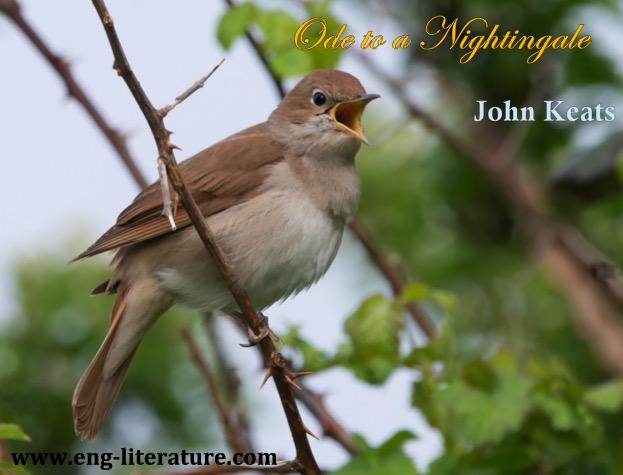Escapism
is the English Romantic Movement as affirmation by Keats and many other poets. Escapists run away from harsh, unpleasant facts and duties,
thus try to hide themselves in their idle world of dream and peace. Yes, a note
of escapism is sounded clearly in “Ode to a Nightingale” because the poet wants
passionately to 'leave the world unseen' and with the nightingale 'fade away
into the forest dim'.
Escapism is the life and soul of romantic poetry. The
romantic poets are all fed up with the hard, stern realities of life – its din
and bustle, fever and fret. The realization that happiness in this world is but
an occasional episode in the general drama of pain is too much for them to
bear. Thus Wordsworth escapes to Nature, the vast world of flowers, trees,
mountains, valleys etc. ; Coleridge to the mysterious world of supernatural,
and Shelley to the Golden Millennium of the future.
“Ode to a Nightingale” is a
poem of escape into the dreamland cast up by Keats’ romantic imagination. The
poet heard the song of nightingale. The song fills his mind with intense joy
which borders no pain. Drunk with delight the poet wants to escape from the
world of “the weariness, the fever and the fret” to the world of fantasy where
evanescence of youth, beauty and love exist. Thus he hits upon different ideas
like opiate himself, taking a small doze of hemlock, sinking into the river of
Lethe, drinking wine but finally he transports himself to the ideal land of
nightingale with “the viewless wings of poesy”.
The
general picture of malady is undeniably moving in its pitiful starkness:
“Here, where men sit and hear each other groan;
Where palsy shakes a few, sad, last grey hairs,
Where youth grows pale, and spectre-thin, and dies,
Where but to think is to be full of sorrow
And leaden-eyed despairs;
Where beauty cannot keep her lustrous eyes,
Or new love pine at them beyond tomorrow.”
“Here, where men sit and hear each other groan;
Where palsy shakes a few, sad, last grey hairs,
Where youth grows pale, and spectre-thin, and dies,
Where but to think is to be full of sorrow
And leaden-eyed despairs;
Where beauty cannot keep her lustrous eyes,
Or new love pine at them beyond tomorrow.”
The poem reflects tragic human experience that human life is a tedious
tale of sorrow, of hopes baffled and efforts disappointed. In this world few
men live up to old age, and even those who are fortunate to live up to that age
are struck with paralysis, and with a few grey hairs on their heads they hobble
along trembling and tottering. Here he remembers the bitterness of his own life. The poet
here thinks of his young brother Tom, dying just before his eyes. He considers that life is full of misery, sorrow and
disease, of tiring struggle, of restlessness and pain; that life is nothing but
a series of groans and complaints. The charm of loveliest woman fades away very
soon, and the love of woman for her lover does not last longer. Here he
remembers his beloved Fanny Browne’s rejection of his young love and turning to
others.
The
note of escapism asserts more strongly in the death-wish of the poet. The
soothing darkness brings up his desire for the dark death –
“… for many a time
I have been half in love with easeful Death”
“… for many a time
I have been half in love with easeful Death”
But
Keats’ world of imagination remains only a short while. The ring of illusion
vanishes. The very word ‘forlorn’ makes him strand on the hard shore of
reality:
“Forlorn!
The very word is like a bell
To
toll me back from thee to my sole self”.
We
may conclude with the voice of C.D. Thorpe as he comments in his book The
Mind of John Keats –
“The moment of insight with him was
a moment of complete emotion,
absorption in which the poet lost even his own senses of being in intense
pursuit of his imaginative query. The extreme of this activity was a flight,
far away from the fret and fever of life into a realm of imaginative delight
into a region of abstractions of the poets own creations.”
~~~~~*~~~~~












0 Comments
Post a Comment